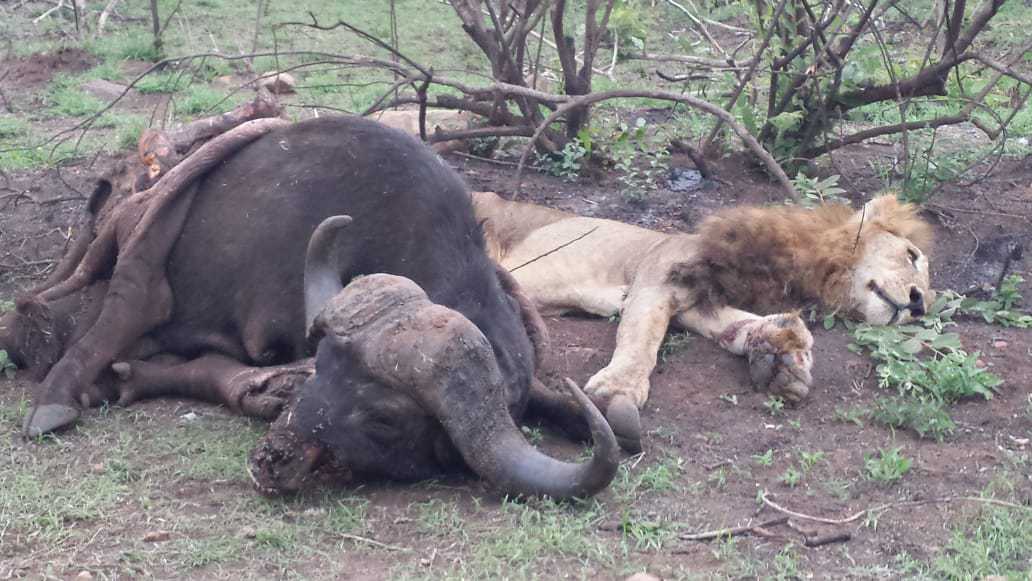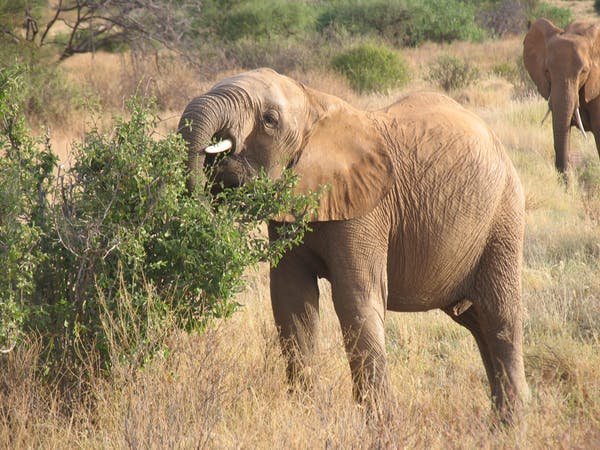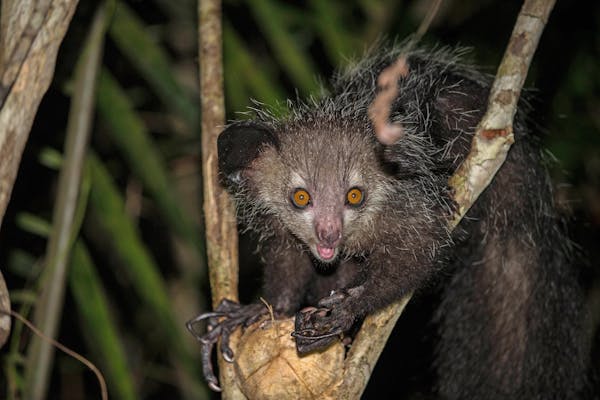Mammals: Interesting or Unusual Behaviour
- Lisbeth
- Site Admin
- Posts: 67391
- Joined: Sat May 19, 2012 12:31 pm
- Country: Switzerland
- Location: Lugano
- Contact:
Re: Interesting or Unusual Behaviour
Greedy 
"Education is the most powerful weapon which you can use to change the world." Nelson Mandela
The desire for equality must never exceed the demands of knowledge
The desire for equality must never exceed the demands of knowledge
- Alf
- Posts: 11606
- Joined: Wed Nov 26, 2014 12:40 pm
- Country: south africa
- Location: centurion
- Contact:
Re: Interesting or Unusual Behaviour
Amazing action photos
Next trip to the bush??
Let me think......................
Let me think......................
- Peter Betts
- Posts: 3084
- Joined: Fri Jun 01, 2012 9:28 am
- Country: RSA
- Contact:
Re: Interesting or Unusual Behaviour
The artificial environment of the Deep south with its tarred roads and Hollywood camps ...I only really do the H7 as that is the only road into the park from Orpen side ..otherwise Dirt roads all the way so I dont have to experience Walt Disney set up scenes like this
- Richprins
- Committee Member
- Posts: 75967
- Joined: Sat May 19, 2012 3:52 pm
- Location: NELSPRUIT
- Contact:
Re: Interesting or Unusual Behaviour
I wonder if this is not snakebite? 
Probably a snare, though?

Kruger Sightings
@LatestKruger
Another sad sighting on the S25 that also broke my heart! This Lion's foot was so sore he couldn't walk. Females caught the Buffalo happily but he was so lean and struggling to eat!
Tinged by Marie
(Photos)
Probably a snare, though?

Kruger Sightings
@LatestKruger
Another sad sighting on the S25 that also broke my heart! This Lion's foot was so sore he couldn't walk. Females caught the Buffalo happily but he was so lean and struggling to eat!
Tinged by Marie
(Photos)
Please check Needs Attention pre-booking: https://africawild-forum.com/viewtopic.php?f=322&t=596
- Lisbeth
- Site Admin
- Posts: 67391
- Joined: Sat May 19, 2012 12:31 pm
- Country: Switzerland
- Location: Lugano
- Contact:
Re: Interesting or Unusual Behaviour
"Education is the most powerful weapon which you can use to change the world." Nelson Mandela
The desire for equality must never exceed the demands of knowledge
The desire for equality must never exceed the demands of knowledge
- Lisbeth
- Site Admin
- Posts: 67391
- Joined: Sat May 19, 2012 12:31 pm
- Country: Switzerland
- Location: Lugano
- Contact:
Re: Interesting or Unusual Behaviour
Elephants get drunk because they can’t metabolize alcohol like us
April 29, 2020 8.04pm | Mareike Janiak
Anecdotes about wild animals seemingly getting drunk after eating rotting fruit are widespread.
There are stories about African elephants eating the overripe fruit of the marula tree (incidentally, Amarula Cream liqueur is made from the same plant). There was that moose in Sweden that got stuck in a tree after eating too many rotting apples. And the vervet monkeys of St. Kitts, whose fondness for sugar and possibly alcohol, drives them to steal drinks from tourists.
Chimpanzees even make tools, in the form of leaf sponges, to access the fermented sap that collects in containers hung from tapped raffia palms in Guinea.
Despite the popularity of these stories in the public imagination, they have often been dismissed as myths. Scientists concluded that it would be unlikely for elephants to eat enough fermented fruit to get drunk because they are so large.
A BBC report on vervet monkeys stealing alcoholic drinks from tourists in St. Kitts.
I am a molecular ecologist and anthropologist who studies digestive adaptations of animals. My colleagues and I just published a new study in the journal Biology Letters on genetic variation related to ethanol metabolism. We found that these conclusions may have been premature and stories about elephants, and other mammals, becoming inebriated from eating rotting fruit may well be true.
Too big to get drunk
When scientists claimed that elephants could not become inebriated from eating rotting fruit, they based those claims on a simple calculation that included the amount of ethanol that’s in marula fruit, how quickly humans break down ethanol and the body size of elephants. So they basically considered how much marula fruit it would take for us to feel intoxicated and then scaled up for an elephant’s size.
However, there is one fatal flaw in this logic — it assumes that elephants are able to break down ethanol as quickly as humans do. Research suggests that this assumption might not be true.

We have long been fascinated by anecdotes about elephants becoming inebriated from eating rotting fruit. (James Higham), Author provided
Humans are quite special in our ability to metabolize ethanol quickly. One of the enzymes involved in breaking down of ethanol, alcohol dehydrogenase class 4, encoded by the gene ADH7, has a variation that makes us 40 times faster at metabolizing ethanol than other primates.
This change evolved around 10 million years ago in our common ancestry with gorillas and chimpanzees, long before we intentionally started fermenting beverages (which began no earlier than 12,000 years ago). The change might be an adaptation for feeding on fruit, especially after switching to a terrestrial lifestyle, where we probably encountered more fallen fruit. Overripe wild fruits and nectars can have surprisingly high ethanol contents, similar to some pale ales!
Elephants are lightweights
So, if humans have an especially fast ethanol metabolism, can we really compare other animals simply by adjusting for body size? To know more about the abilities of other mammals to break down ethanol, we compared the ADH7 gene across 85 mammals.
We found that most of them not share the variation for faster ethanol breakdown, and that many mammals did not even have a functional ADH7 gene, including African and Asian elephants. Even mammoths, an extinct elephant relative, did not have one. What the mammals that lost the ADH7 gene have in common is that they don’t regularly eat a lot of fruit: their diets are comprised of grass (cows, horses, sheep and goats) and other foliage (beavers, elephants) or meat (dogs, sea lions, whales and dolphins).
Now, ethanol metabolism is a complex process that involves several steps and a number of different enzymes, so it’s possible that elephants have another way of breaking down ethanol. But it’s very unlikely that the efficiency with which they can do this is comparable to that of humans. Simply scaling up for body size does not accurately predict whether elephants can become intoxicated from eating old marula fruit.
In human company

Aye-ayes in Madagascar are known to feed on the nectar of the traveler’s palm. (nomis-simon/Flickr), CC BY
Humans do have some company among other mammals who share the same or similar changes to their ADH7 gene. What they tend to have in common is that they eat a lot of fruit or nectar. For example, the aye-aye, a primate that is found on Madagascar, is known to drink the nectar of the traveler’s palm, which is speculated to be fermented.
Fruit bats, like flying foxes or the cave nectar bat, that eat nothing but fruit and nectar might also be better at breaking down ethanol. This might be an important adaptation — as you can imagine, being inebriated would be especially bad news for a flying mammal.
The diets of mammals are wondrously diverse and so are their digestive systems and adaptations. Instead of extrapolating from humans and anthropomorphizing animal metabolism, we need to consider the evolutionary history of each species and their diets.
All of those stories about drunken animals? There might be some truth to them after all.
April 29, 2020 8.04pm | Mareike Janiak
Anecdotes about wild animals seemingly getting drunk after eating rotting fruit are widespread.
There are stories about African elephants eating the overripe fruit of the marula tree (incidentally, Amarula Cream liqueur is made from the same plant). There was that moose in Sweden that got stuck in a tree after eating too many rotting apples. And the vervet monkeys of St. Kitts, whose fondness for sugar and possibly alcohol, drives them to steal drinks from tourists.
Chimpanzees even make tools, in the form of leaf sponges, to access the fermented sap that collects in containers hung from tapped raffia palms in Guinea.
Despite the popularity of these stories in the public imagination, they have often been dismissed as myths. Scientists concluded that it would be unlikely for elephants to eat enough fermented fruit to get drunk because they are so large.
A BBC report on vervet monkeys stealing alcoholic drinks from tourists in St. Kitts.
I am a molecular ecologist and anthropologist who studies digestive adaptations of animals. My colleagues and I just published a new study in the journal Biology Letters on genetic variation related to ethanol metabolism. We found that these conclusions may have been premature and stories about elephants, and other mammals, becoming inebriated from eating rotting fruit may well be true.
Too big to get drunk
When scientists claimed that elephants could not become inebriated from eating rotting fruit, they based those claims on a simple calculation that included the amount of ethanol that’s in marula fruit, how quickly humans break down ethanol and the body size of elephants. So they basically considered how much marula fruit it would take for us to feel intoxicated and then scaled up for an elephant’s size.
However, there is one fatal flaw in this logic — it assumes that elephants are able to break down ethanol as quickly as humans do. Research suggests that this assumption might not be true.

We have long been fascinated by anecdotes about elephants becoming inebriated from eating rotting fruit. (James Higham), Author provided
Humans are quite special in our ability to metabolize ethanol quickly. One of the enzymes involved in breaking down of ethanol, alcohol dehydrogenase class 4, encoded by the gene ADH7, has a variation that makes us 40 times faster at metabolizing ethanol than other primates.
This change evolved around 10 million years ago in our common ancestry with gorillas and chimpanzees, long before we intentionally started fermenting beverages (which began no earlier than 12,000 years ago). The change might be an adaptation for feeding on fruit, especially after switching to a terrestrial lifestyle, where we probably encountered more fallen fruit. Overripe wild fruits and nectars can have surprisingly high ethanol contents, similar to some pale ales!
Elephants are lightweights
So, if humans have an especially fast ethanol metabolism, can we really compare other animals simply by adjusting for body size? To know more about the abilities of other mammals to break down ethanol, we compared the ADH7 gene across 85 mammals.
We found that most of them not share the variation for faster ethanol breakdown, and that many mammals did not even have a functional ADH7 gene, including African and Asian elephants. Even mammoths, an extinct elephant relative, did not have one. What the mammals that lost the ADH7 gene have in common is that they don’t regularly eat a lot of fruit: their diets are comprised of grass (cows, horses, sheep and goats) and other foliage (beavers, elephants) or meat (dogs, sea lions, whales and dolphins).
Now, ethanol metabolism is a complex process that involves several steps and a number of different enzymes, so it’s possible that elephants have another way of breaking down ethanol. But it’s very unlikely that the efficiency with which they can do this is comparable to that of humans. Simply scaling up for body size does not accurately predict whether elephants can become intoxicated from eating old marula fruit.
In human company

Aye-ayes in Madagascar are known to feed on the nectar of the traveler’s palm. (nomis-simon/Flickr), CC BY
Humans do have some company among other mammals who share the same or similar changes to their ADH7 gene. What they tend to have in common is that they eat a lot of fruit or nectar. For example, the aye-aye, a primate that is found on Madagascar, is known to drink the nectar of the traveler’s palm, which is speculated to be fermented.
Fruit bats, like flying foxes or the cave nectar bat, that eat nothing but fruit and nectar might also be better at breaking down ethanol. This might be an important adaptation — as you can imagine, being inebriated would be especially bad news for a flying mammal.
The diets of mammals are wondrously diverse and so are their digestive systems and adaptations. Instead of extrapolating from humans and anthropomorphizing animal metabolism, we need to consider the evolutionary history of each species and their diets.
All of those stories about drunken animals? There might be some truth to them after all.
"Education is the most powerful weapon which you can use to change the world." Nelson Mandela
The desire for equality must never exceed the demands of knowledge
The desire for equality must never exceed the demands of knowledge
- Richprins
- Committee Member
- Posts: 75967
- Joined: Sat May 19, 2012 3:52 pm
- Location: NELSPRUIT
- Contact:
Re: Interesting or Unusual Behaviour
Very interesting!
Have forwarded for comment.
Have forwarded for comment.
Please check Needs Attention pre-booking: https://africawild-forum.com/viewtopic.php?f=322&t=596
- Richprins
- Committee Member
- Posts: 75967
- Joined: Sat May 19, 2012 3:52 pm
- Location: NELSPRUIT
- Contact:
Re: Interesting or Unusual Behaviour
Quite rare stuff here, and lots from SA! 
(Not very bright commentary, but interesting! )
)
(Not very bright commentary, but interesting!
Please check Needs Attention pre-booking: https://africawild-forum.com/viewtopic.php?f=322&t=596
- Lisbeth
- Site Admin
- Posts: 67391
- Joined: Sat May 19, 2012 12:31 pm
- Country: Switzerland
- Location: Lugano
- Contact:
Re: Interesting or Unusual Behaviour
After a while it gets boring 
"Education is the most powerful weapon which you can use to change the world." Nelson Mandela
The desire for equality must never exceed the demands of knowledge
The desire for equality must never exceed the demands of knowledge


